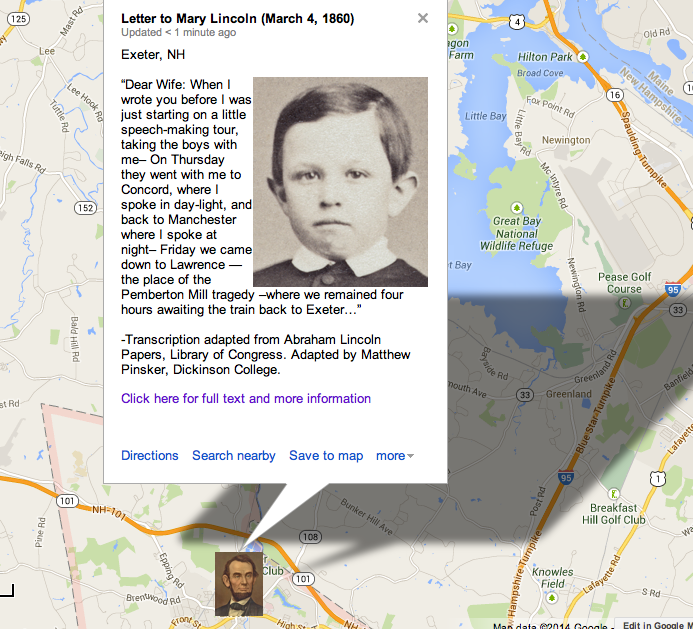Contributing Editors for this page include Christopher Watson
Ranking
#140 on the list of 150 Most Teachable Lincoln Documents
Annotated Transcript
On This Date
HD Daily Report, March 4, 1860
The Lincoln Log, March 4, 1860
Custom Map
Close Readings
Christopher Watson, “Understanding Lincoln” blog post (via Quora), June 26, 2014
How Historians Interpret
“Lincoln’s success at Cooper Institute led to many speaking invitations from Republicans in New England, Pennsylvania, and New Jersey. He had originally intended to visit his son Robert at Phillips Exeter Academy in New Hampshire and then return to Springfield promptly, but he agreed to take to the stump in the Granite State, in Rhode Island, and in Connecticut, where state elections were scheduled that April. The race in Connecticut was especially important, for Democrats believed that their popular candidate, Thomas Seymour, could capture the governorship, thus breaking the Republican hold on New England and inspiring Democrats everywhere. During the next two weeks, Lincoln gave hastily-scheduled addresses in Providence and Woonsocket, Rhode Island; Manchester, Exeter, Concord, and Dover, New Hampshire; and Hartford, New Haven, Bridgeport, Norwich, and Meriden, Connecticut. In the midst of that whirlwind tour, he complained to his wife: ‘I have been unable to escape this toil. If I had foreseen it I think I would not have come East at all. The speech at New York, being within my calculation before I started, went off passably well, and gave me no trouble whatever. The difficulty was to make nine others, before reading audiences, who have already seen all my ideas in print.’”
–Michael Burlingame, Abraham Lincoln: A Life, Volume 1 (Baltimore: The Johns Hopkins University Press, 2008), 1609-1610.
“Lincoln stayed at Exeter Sunday night and left on the morning train. On his way home to Springfield, he made a number of other political stops, making a total of ten speeches during his eastern trip, although he originally had only intended to make the one in New York. Such a busy schedule caused him to tell his wife, ‘I have been unable to escape this toil. If I had foreseen it I think I would not have come East at all.’ Robert found this comment by his father ‘interesting in view of the effect which was made upon his future career without thought of it by him, by his unanticipated speeches, which would not have been made but for a visit to a schoolboy.’” 46
–Jason Emerson, Giant in the Shadows: The Life of Robert T. Lincoln (Carbondale: Southern Illinois University Press, 2012), 46.
NOTE TO READERS
This page is under construction and will be developed further by students in the new “Understanding Lincoln” online course sponsored by the House Divided Project at Dickinson College and the Gilder Lehrman Institute of American History. To find out more about the course and to see some of our videotaped class sessions, including virtual field trips to Ford’s Theatre and Gettysburg, please visit our Livestream page at http://new.livestream.com/gilderlehrman/lincoln

